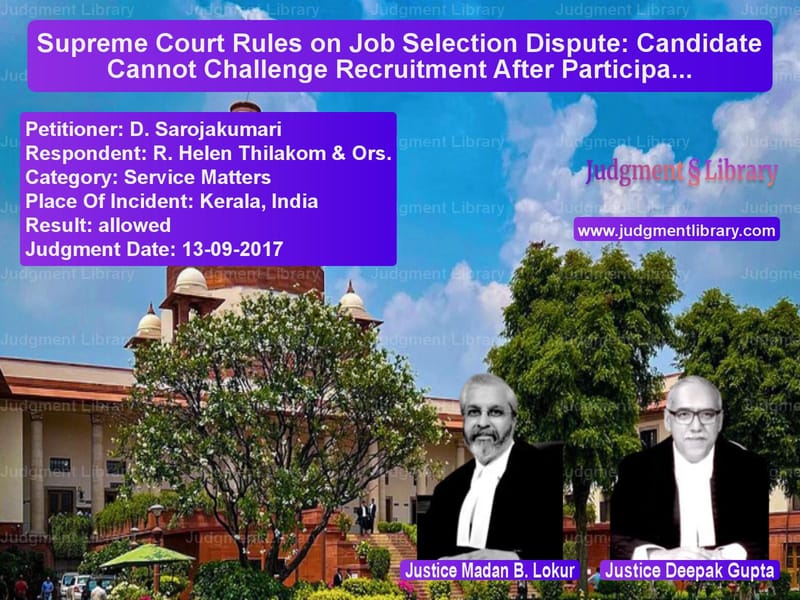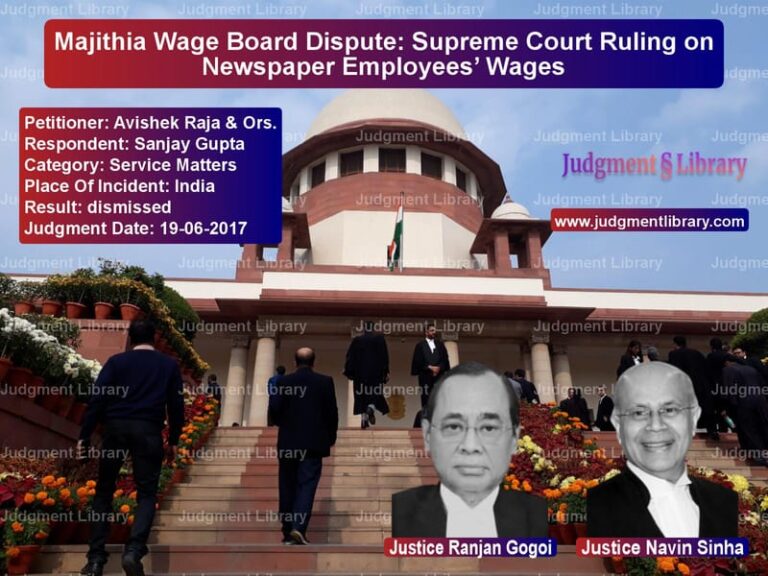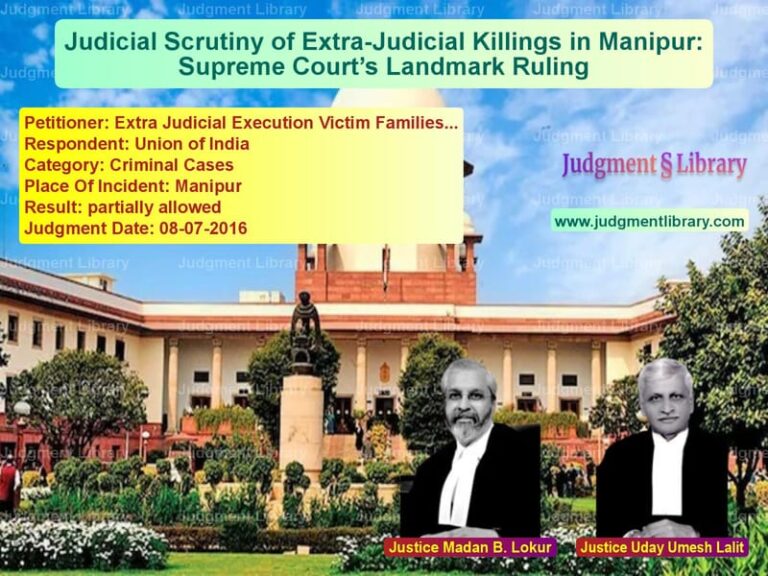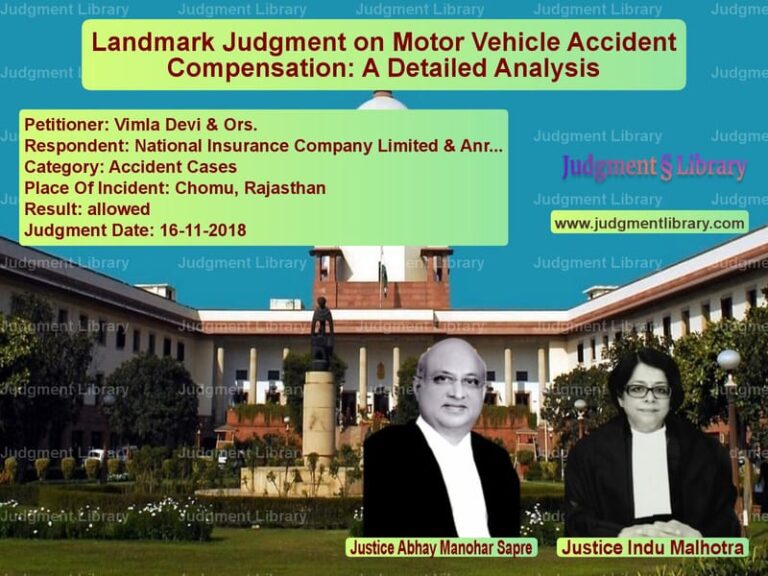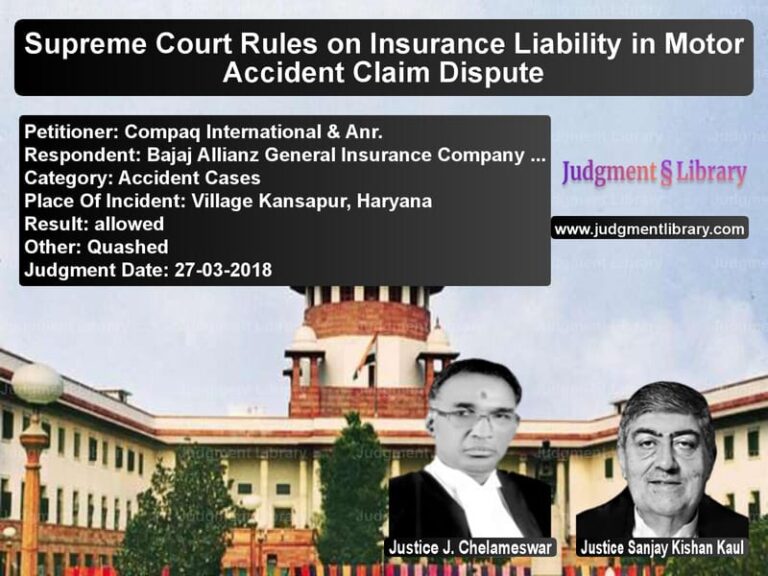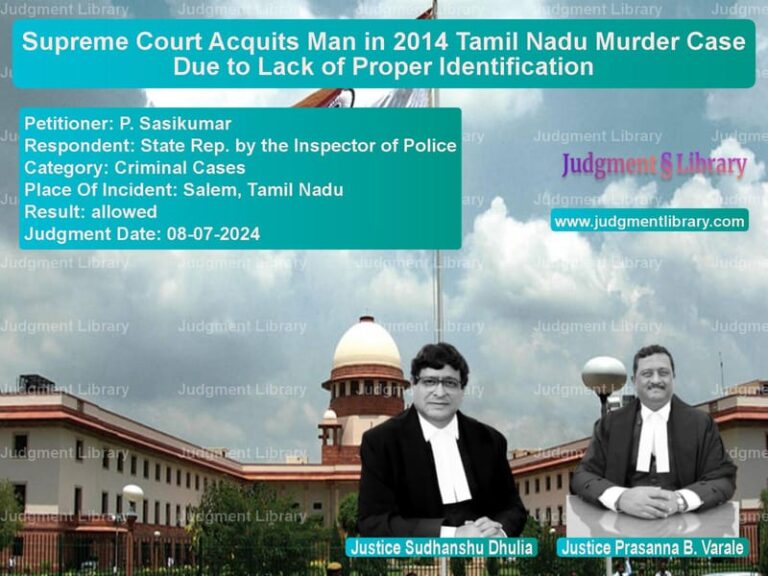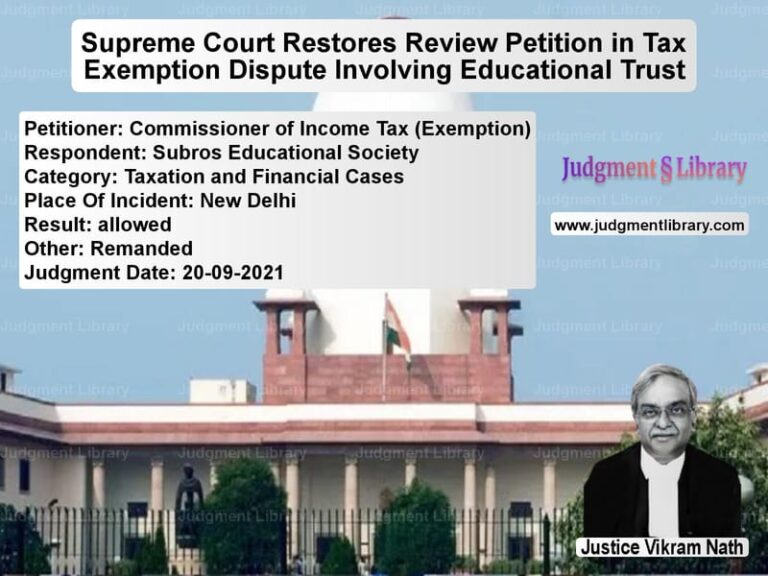Supreme Court Rules on Job Selection Dispute: Candidate Cannot Challenge Recruitment After Participation
The case of D. Sarojakumari v. R. Helen Thilakom & Ors. revolved around a dispute regarding the appointment of a music teacher in a school run by the Church of South India in Kerala. The Supreme Court, in its judgment dated September 13, 2017, ruled that a candidate who voluntarily participated in the recruitment process cannot later challenge its validity if they are unsuccessful.
Background of the Case
The case involved two schools, Samuel LMS High School, Parassala, and Light to the Blind School, Varkala, both run by the Church of South India. Respondent No. 1 (R. Helen Thilakom) was working as a part-time music teacher at Light to the Blind School. When a vacancy for a full-time music teacher arose at Samuel LMS High School, the management invited applications for direct recruitment.
Both the appellant, D. Sarojakumari, and the respondent, R. Helen Thilakom, applied for the post. The appellant was selected and appointed on July 12, 1999. However, after failing to secure the job, the respondent challenged the selection process, arguing that she was entitled to be promoted instead of the vacancy being filled through direct recruitment.
Legal Issues
- Could a candidate challenge the selection process after voluntarily participating in it?
- Were both schools considered a single unit for the purpose of seniority and promotion?
- Did the Kerala Education Rules (KER) mandate that the vacancy should have been filled through promotion?
Arguments by the Appellant (D. Sarojakumari)
The appellant contended:
- The respondent had participated in the selection process without raising any objections.
- After being unsuccessful, the respondent challenged the recruitment process, which was not legally permissible.
- The two schools were separate institutions, and the respondent could not claim seniority for promotion.
- The school management had the discretion to fill the vacancy through direct recruitment.
Arguments by the Respondent (R. Helen Thilakom)
The respondent countered:
- Since both schools were managed by the same body, she was entitled to be promoted rather than the vacancy being filled through direct recruitment.
- Under Rule 43 of the Kerala Education Rules (KER), her seniority should have been considered for promotion.
- The selection process was unfair as the management failed to recognize her rights as an existing employee.
Supreme Court’s Analysis
On Challenging Recruitment After Participation
The Supreme Court reaffirmed the principle that a candidate who participates in a selection process without protest cannot later challenge it after being unsuccessful. It cited previous judgments, including Dr. G. Sarna v. University of Lucknow (1976), where it was held:
“A candidate who voluntarily participates in the recruitment process and is not selected cannot later challenge the selection process. Having taken a chance, they cannot turn around and question the constitution of the committee or the recruitment method.”
On the Status of the Two Schools
The Court found that Samuel LMS High School and Light to the Blind School were separate institutions with distinct objectives. While the former was a general school, the latter catered specifically to differently-abled students. The Court ruled:
“The two schools have never maintained a common seniority list, and treating them as a single unit for promotions was incorrect.”
On the Applicability of Rule 43 of KER
The Court noted that Rule 43 of the Kerala Education Rules did not apply in this case, as both schools were separate entities. The respondent could not claim an automatic right to promotion. The Court observed:
“Rule 43 of KER does not apply when there is no common seniority list and the institutions have always functioned independently.”
Final Judgment
The Supreme Court set aside the judgment of the Kerala High Court and dismissed the writ petition filed by the respondent. It ruled:
“A person who participates in the selection process and is unsuccessful cannot later turn around and challenge the process. The High Court erred in ignoring this settled legal principle.”
Conclusion and Impact
This judgment reinforces the principle that candidates who willingly take part in a recruitment process must abide by its outcome. The key takeaways from this ruling are:
- A candidate cannot challenge a selection process after voluntarily participating in it.
- Educational institutions with different objectives cannot be treated as a single unit for promotions.
- Promotion claims must be based on an established seniority list and applicable rules.
The ruling sets a precedent that discourages frivolous legal challenges to recruitment processes and ensures fairness in public sector employment decisions.
Don’t miss out on the full details! Download the complete judgment in PDF format below and gain valuable insights instantly!
Download Judgment: D. Sarojakumari vs R. Helen Thilakom & Supreme Court of India Judgment Dated 13-09-2017.pdf
Direct Downlaod Judgment: Direct downlaod this Judgment
See all petitions in Employment Disputes
See all petitions in Recruitment Policies
See all petitions in Public Sector Employees
See all petitions in Judgment by Madan B. Lokur
See all petitions in Judgment by Deepak Gupta
See all petitions in allowed
See all petitions in supreme court of India judgments September 2017
See all petitions in 2017 judgments
See all posts in Service Matters Category
See all allowed petitions in Service Matters Category
See all Dismissed petitions in Service Matters Category
See all partially allowed petitions in Service Matters Category

